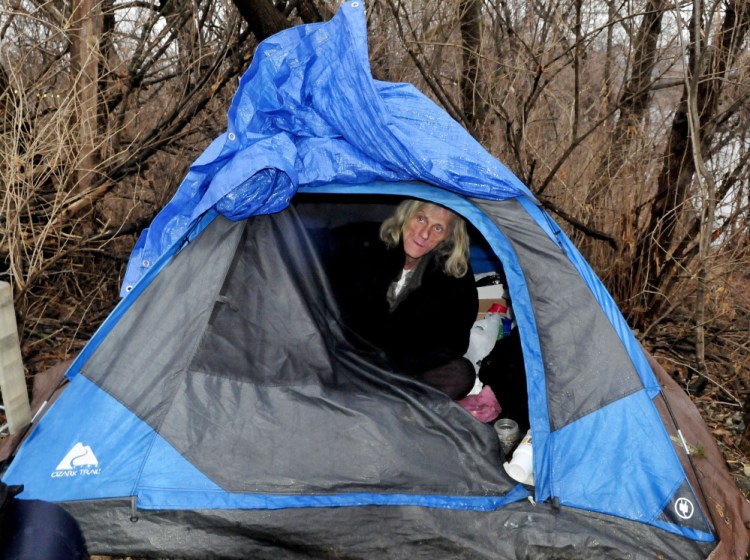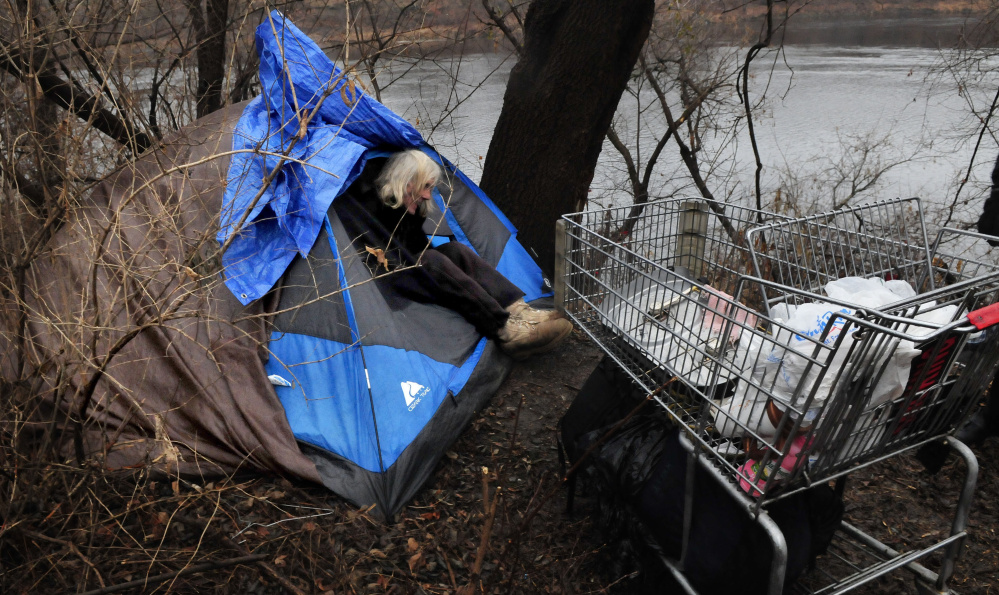Vaughan Orchard won’t soon forget the time it was 20 below zero in Waterville and he entered a laundromat to get warm.
“I got kicked out,” he said. “I was in there 22 minutes. But that individual who kicked me out got fired, and this year they said if it’s raining, I can go inside.”
Orchard, 71, lives in a tent down by the Kennebec River near Head of Falls and that’s where I met him 10 days before Christmas.
It was cold and rainy and he had just taken off his boots to take a nap when I called to him from outside his tattered blue tent.
He peered out at me and was reluctant to talk at first, but after we chatted a while, he warmed up and told me about his life. We talked an hour or so, and before we parted I asked what he’d want people to know about him.
“I have nothing to hide,” he said. “I don’t hide. I don’t screw over people. I don’t lie. I don’t steal. You have good people and bad people.”
When I asked how long he has been homeless, the 6-foot-tall, thin, wiry man with gray-blond hair and blue eyes said he has lived in a tent six years, but then clarified his response.
“I haven’t lived in years. It isn’t living. It’s going day to day. I get by.”
Orchard spends his days picking up bottles and cans to turn in for cash to buy coffee and food.
“The most I’ve actually made is $23 in one day,” he said. “It sounds like a lot, but it isn’t.”
He acknowledges he can’t make it on his own. There are people who help. A woman named Brenda brings him food sometimes, and there’s a guy named Brian who is trying to convince him to get a more durable shelter, like a car tarp that you can buy at Tractor Supply.
“I’m pretty well-known between the cops and Betty Palmer,” he said.
Palmer, executive director of the Mid-Maine Homeless Shelter, keeps tabs on Orchard, and police check on him occasionally too, he said. But he doesn’t want to live at the shelter because there are rules there and he wants to be independent. At the shelter, for instance, you can’t just get up at midnight and go out for coffee if you want, he said.
When you are homeless, you run into nice people, but there are bad ones too — like those who steal, according to Orchard.
“I had someone give me a brand new tent, and a day later someone liked it better than me,” he said. “I got to break it in anyway.”
He has experienced cruelty too.
“Some people laugh at me. I’ve actually eaten out of the rubbish before. A guy and girl and their little one were laughing at me. I don’t care for that, you know? I don’t care for a lot of things. Five years ago I went to a college here because I heard they throw out food in the dumpster. It was actually still warm, and I was eating it. They complained. They called the cops.”
That logic makes no sense to Orchard, who doesn’t believe in wasting food.
“If you’re going to throw it away anyway, what’s the big deal? If I have something, I share it. I got $2.30 in my pocket, and I’m willing to split it $1.15 apiece.”
One day, an acquaintance of Orchard made fun of a woman who was obese and had stains on her clothes. Orchard said he scolded him.
“You don’t know what someone’s going through. You don’t know what that individual’s been through. I hate ’em when they make fun. If you don’t know that individual, shut your mouth and leave that individual be.”
Orchard grew up in Lynn, Massachusetts, and graduated from a private high school, he said. He said he has no family and was raised by a woman named Kay Darling who took him under his wing. She died long ago, he said.
He entered the U.S. Army after high school and became a private first class, but while working to build a gymnasium in Virginia, he was pushed into a pit and a rebar went into his back, he said. He broke his back, collarbone, shoulder and ribs and punctured a lung, he said. He got out of the Army after 2 1/2 years and entered Boston University, where he earned a bachelor’s in engineering, he said.
He wanted to be a school teacher but that didn’t happen. Instead, he started working at a large Boston hospital and became a certified nurse’s aide. After a while he started working with patients who had lost arms and legs, and he liked those people.
“I ended up getting attached to them, and I worked with them and made prostheses and designed them myself, and I designed wheelchairs. But I got annoyed with the staff and how they treated patients and I left.”
He bought a big rig and drove a truck about 18 years, traveling around the country, hauling food, clothes, tires, motorcycle parts and other goods. He lived in Florida and later moved to Maine. He has a hard time remembering dates and times and can’t say just when his life took a downturn.
He has been fighting to get money from Social Security and the Department of Veterans Affairs but receives none, he said, so he wanders the streets of Waterville, looking for returnables and cleaning up litter in parks. He pays particular attention to keeping the small park in The Concourse tidy, he said.
“I don’t bum. I don’t ask. I do go up to the homeless shelter. I do ask for baby wipes because I clean up with baby wipes.”
Once in a while, he eats at the Sacred Heart Catholic Church Soup Kitchen on Elm Street. He doesn’t see a doctor and gets no medical attention. If he gets sick, he wings it.
“I don’t go to the hospital. I don’t believe in them. I had a severe cold and flu, and Brenda brought me cough syrup and tea.”
Unexpected things happen. Three days ago, his Coleman stove broke so he can’t heat up canned soup anymore.
Like most people, he doesn’t like being cold, but lives with it and dreams of having his own warm place one day.
“If I had my choice, it wouldn’t be an apartment — it’d be a van or something I could actually sleep in and help out other people. I’d like to give back to the hungry. I share what I got. I’ve gone without so long, I can’t stand someone else going without.”
Amy Calder has been a Morning Sentinel reporter 27 years. Her column appears here Mondays. She may be reached at acalder@centralmaine.com. For previous Reporting Aside columns, go to centralmaine.com.
Send questions/comments to the editors.





Comments are no longer available on this story